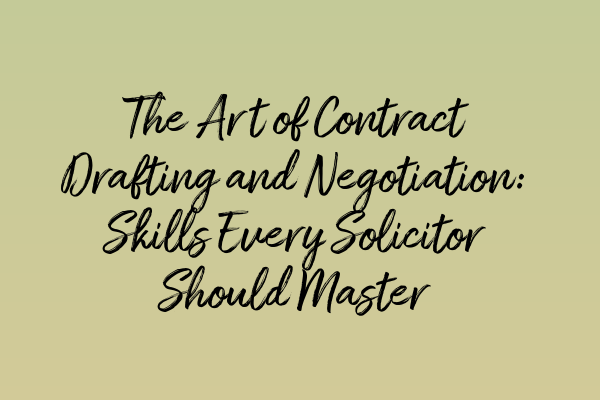The Art of Contract Drafting and Negotiation: Skills Every Solicitor Should Master
Contract drafting and negotiation is a critical skill set that every solicitor should master. In the legal profession, contracts are the backbone of business transactions and legal agreements. The ability to draft a well-structured and comprehensive contract, and negotiate its terms effectively, can make a significant difference in the success of your clients and their businesses.
The Importance of Contract Drafting
Contract drafting is the process of creating a legally enforceable agreement between two or more parties. It requires precision, attention to detail, and a deep understanding of the law. A poorly drafted contract can lead to confusion, disputes, and potential litigation.
As a solicitor, your role in contract drafting is crucial. You need to ensure that the contract accurately reflects the intentions of the parties involved, clearly defines the rights and obligations of each party, and mitigates potential risks. By crafting a well-drafted contract, you can protect your clients’ interests and provide them with a solid foundation for their business dealings.
The Key Elements of an Effective Contract
When drafting a contract, there are several key elements that you must consider:
- Clear and Concise Language: Contracts should be written in plain and easily understandable language. Avoid legalese and complex terminology that might confuse or mislead the parties involved.
- Precise Definitions: Define all terms and concepts used in the contract to ensure clarity and prevent misinterpretation.
- Scope and Duration: Clearly outline the scope of the contract and the duration for which it is valid. This helps avoid any misunderstandings regarding the parties’ obligations and the duration of their agreement.
- Performance Obligations: Specify the exact obligations and responsibilities of each party. This includes delivery dates, payment terms, and any other relevant performance-related details.
- Dispute Resolution Mechanisms: Include provisions for resolving disputes, such as mediation or arbitration, to minimize the risk of costly litigation.
- Termination and Renewal: Clearly define the conditions under which the contract can be terminated or renewed, including any notice requirements.
By paying close attention to these key elements, you can draft a comprehensive and effective contract that protects your client’s interests and minimizes potential disputes.
The Art of Negotiation
Once the initial draft of the contract is prepared, the negotiation process begins. Negotiating the terms of a contract requires strong communication skills, legal knowledge, and the ability to find common ground between the parties involved.
During negotiations, solicitors act as advocates for their clients, ensuring that their interests are protected while also seeking a mutually beneficial outcome. It’s essential to approach negotiations with a collaborative mindset, aiming for compromise and win-win solutions.
A successful negotiation involves active listening, effective argumentation, and the ability to persuade and convince. As a solicitor, you need to understand not only the legal aspects of the contract but also the needs and objectives of your client. This allows you to tailor your negotiation strategies accordingly and achieve the best possible outcome.
The Role of Technology in Contract Drafting and Negotiation
In today’s digital age, technology has revolutionized the way solicitors approach contract drafting and negotiation. There are various digital tools and software available that streamline the drafting process, allowing for greater efficiency and accuracy.
One notable example is contract management software, which helps track revisions, manage versions, and centralize contract repositories. These tools simplify collaboration between solicitors and clients, ensuring that all parties are on the same page throughout the negotiation process.
Additionally, technology has enabled the use of electronic signatures, making contract execution faster and more convenient. This eliminates the need for physical signatures and allows parties to sign contracts digitally, saving time and resources.
Conclusion
The art of contract drafting and negotiation is a critical skill set for every solicitor. By mastering these skills, you can effectively protect your clients’ interests and provide them with well-crafted contracts that withstand legal scrutiny. Remember to pay close attention to the key elements of an effective contract, approach negotiations with a collaborative mindset, and leverage technology to streamline the process.
Related Articles:


Leave a Reply